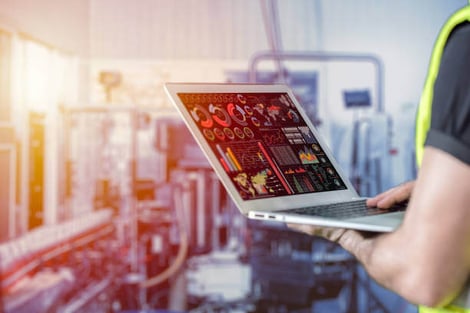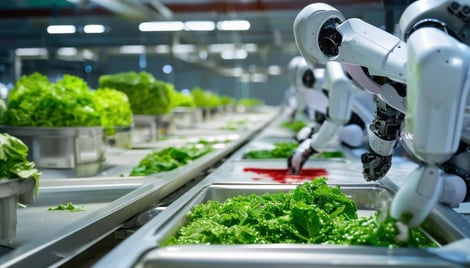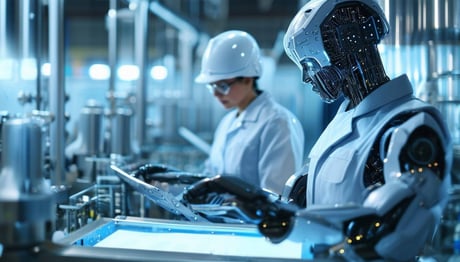
AI-Driven Metrics for Sustainable Production Schedules in Food and Beverage Manufacturing
With mounting regulatory pressures, increasing consumer demand for eco-friendly products, and the imperative to reduce operational costs, Operations Directors face the challenge of balancing efficiency with environmental responsibility. Leveraging AI-driven metrics through tools like PlanetTogether integrated with enterprise solutions such as SAP, Oracle, Microsoft, Kinaxis, or Aveva can be a game-changer in achieving sustainable production schedules.

The Intersection of AI and Sustainability in Manufacturing
Artificial Intelligence (AI) has the potential to revolutionize manufacturing by enabling smarter decision-making and uncovering opportunities for optimization. For Operations Directors, AI provides actionable insights that improve production efficiency while minimizing waste and reducing environmental impact. In food and beverage manufacturing, where resource utilization and time-sensitive production are critical, AI-driven tools can analyze vast datasets to:
Optimize resource allocation.
Predict maintenance needs to avoid downtime.
Enhance supply chain responsiveness.
Reduce energy and water consumption.
By incorporating sustainability metrics directly into production planning processes, these tools empower manufacturers to meet both operational and environmental goals.


PlanetTogether and Enterprise Integration: A Unified Approach
PlanetTogether, a leading advanced planning and scheduling (APS) software, becomes even more powerful when integrated with enterprise systems such as SAP, Oracle, Microsoft Dynamics, Kinaxis, or Aveva. This integration enables seamless data flow between planning, production, and supply chain management, ensuring that every aspect of the operation is aligned with sustainability objectives.
Key Benefits of Integration:
Real-Time Data Synchronization
Integration ensures that production schedules reflect real-time inventory levels, equipment availability, and supply chain disruptions.
Enhanced Decision-Making
AI-driven metrics, combined with ERP data, provide Operations Directors with insights to make informed decisions that balance cost, efficiency, and sustainability.
Improved Traceability
Tracking resources from procurement to production to distribution becomes easier, facilitating compliance with sustainability standards.
Scalability
The integration supports scaling sustainable practices across multiple facilities and geographies.

AI-Driven Metrics for Sustainable Scheduling
AI-driven metrics enable a data-centric approach to sustainability in production scheduling. Here are some key metrics and how they drive sustainable practices in food and beverage manufacturing:
Energy Efficiency Metrics
Energy consumption is a significant concern for food and beverage manufacturers. AI tools analyze energy usage patterns and identify opportunities for reduction. For example:
Scheduling energy-intensive operations during off-peak hours to take advantage of lower energy rates.
Identifying and prioritizing equipment with higher energy efficiency.
Integration with systems like SAP’s energy management module ensures that these insights translate into actionable changes.
Water Usage Metrics
Water is a critical resource in food and beverage production, used in cleaning, processing, and cooling. AI-driven tools monitor water usage across processes and provide actionable insights, such as:
Reducing water consumption by optimizing cleaning cycles.
Implementing closed-loop water systems to recycle and reuse water efficiently.
By linking PlanetTogether’s scheduling capabilities with systems like Aveva’s asset management solutions, manufacturers can track and reduce water waste effectively.
Waste Reduction Metrics
Minimizing waste is crucial for sustainability. AI can identify inefficiencies in raw material usage and recommend adjustments to reduce scrap and byproducts. Examples include:
Optimizing batch sizes to minimize leftover ingredients.
Scheduling production runs to align with shelf-life requirements and demand forecasts.
Integration with Kinaxis’ supply chain planning ensures that waste reduction strategies are aligned across the supply chain.
Carbon Footprint Metrics
AI tools calculate the carbon footprint of production activities by analyzing energy use, transportation, and resource consumption. These insights enable:
Adjusting schedules to prioritize low-carbon production methods.
Sourcing materials from suppliers with lower carbon footprints.
Oracle’s cloud solutions, when integrated with PlanetTogether, provide real-time visibility into emissions data, helping manufacturers make environmentally conscious decisions.
On-Time Delivery Metrics
Sustainability isn’t just about reducing waste—it’s also about ensuring customer satisfaction through timely delivery. AI-driven scheduling tools optimize production timelines to meet demand without overproducing or stockpiling. By synchronizing with Microsoft Dynamics 365, manufacturers can ensure that production schedules align with real-time demand forecasts and distribution plans.

Steps to Implement AI-Driven Sustainable Scheduling
For Operations Directors aiming to adopt AI-driven metrics for sustainability, here are the key steps:
Assess Current Processes: Identify areas where energy, water, or material waste can be reduced.
Choose the Right Tools: Select APS software like PlanetTogether and integrate it with enterprise systems such as SAP, Oracle, or Microsoft Dynamics.
Define Sustainability Metrics: Set measurable goals for energy efficiency, water usage, waste reduction, and carbon footprint.
Implement AI Solutions: Use AI tools to analyze data, generate insights, and recommend optimizations.
Monitor and Adjust: Continuously monitor performance against sustainability metrics and refine processes as needed.
The integration of AI-driven metrics with advanced planning and scheduling tools marks a new era for sustainable production in food and beverage manufacturing. Operations Directors have a unique opportunity to lead this transformation by aligning operational efficiency with environmental stewardship.
By leveraging the capabilities of PlanetTogether and enterprise solutions like SAP, Oracle, Microsoft, Kinaxis, or Aveva, manufacturers can achieve a delicate balance: reducing environmental impact while meeting the demands of a competitive market. The result is not only a more sustainable operation but also a stronger brand reputation and long-term profitability.
Are you ready to take your manufacturing operations to the next level? Contact us today to learn more about how PlanetTogether can help you achieve your goals and drive success in your industry.




